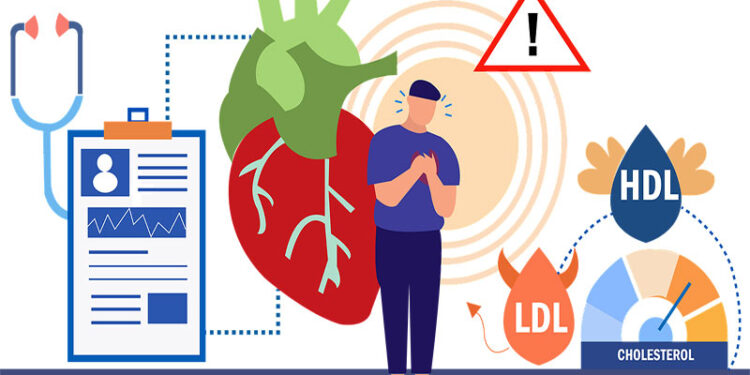1.Chronic Kidney Disease: Across the globe, the total number of individuals with chronic kidney disease (CKD) who are not treated with kidney replacement therapy was approximately 850 million in 2017. As the GFR declines in range of 60 − 75 mL/min/1.73 m2, the probability of developing CAD increases linearly, with up to triple the CVD mortality risk when reaching an eGFR of 15 mL/min/1.73 m2. Multiple Nephrology Associations have recommended starting statin therapy for all CKD patients. Check with your kidney doctor about the risk of having major heart attack and preventive therapies.
2. COPD: Patients with mild-to-moderate COPD are 8–10 times more likely to die from ASCVD than respiratory failure, having higher rates of hospitalization and death due to CVD, stroke, and HF. Cardio vascular disease mortality increases by 28%, and the frequency of non-fatal coronary events by 20%, for every 10% decrease in the forced expiratory volume in 1 second (FEV1).
Acute COPD exacerbations, mainly due to infections, are frequent and are responsible for a four-fold increase of CVD events. The risk of both myocardial infarction and ischemic stroke is increased during the 3 months after an acute exacerbation.
COPD is also a risk factor for ventricular tachycardia independent of LVEF, and for sudden cardiac death independent of CVD risk profile. Unrecognized ventricular dysfunction is common in COPD, although HF is 3.8 times more common in COPD patients than in controls.
3. Rheumatoid Arthritis and inflammatory bowel diseases: Rheumatoid arthritis is chronic inflammatory disease condition which increases CVD risk by approximately 50% beyond established risk factors. There is also evidence for an approximately 20% increased CVD risk in patients with active inflammatory bowel disease.
4. Viral infection/Influenza: The risk of AMI or stroke is more than four times higher after a respiratory tract infection, with the highest risk in the first 3 days after diagnosis. Preventing influenza, particularly by means of vaccination, could prevent influenza-triggered Acute myocardial infarction specially in patients with prior history of coronary artery disease.
5. Hypertension: Longitudinal studies have shown that raised BP is a major cause of both ASCVD and non-atherosclerotic CVD [particularly heart failure (HF)], accounting for 9.4 million deaths. It affects more than 150 million people across Europe, over 1 billion globally, with a prevalence of ∼30–45% in adults, increasing with age to more than 60% in people aged >60 years, and accounting for ∼10 million deaths globally per annum.
7 Cancer: ASCVD Risk assessment is highly recommended in cancer patients undergoing treatment. A study showed a significantly higher risk of CVD in survivors of childhood cancer than in non-cancer adult controls, and particularly in survivors of adult-onset cancer with underlying ASCVD risk factors. Therefore, aggressive management of ASCVD risk factors in this population is strongly recommended.
8. Migraine: Migraine overall is associated with a two-fold increased risk of ischemic stroke and a 1.5-fold increase in the risk of cardiac ischemic disease. The associations are more evident for migraine with aura. Evidence also indicate that the vascular risk of subjects with migraine may be magnified by cigarette smoking and by the use of combined hormonal contraceptives. Contraception using combined hormonal contraceptives should therefore be avoided in women with migraine.
9.Sleep Disorders: Regarding sleep duration, 7 hour seems to be optimal for Cardiovascular health. Prevalence of general sleep disturbances is around 32.1% with 8.2% having insomnia, 6.1% parasomnia, 5.9% for hyper-somnolence,12.5% for restless legs disorder and limb movements during sleep, and 7.1% for sleep-related breathing disorder. There is strong associations of Obstructive sleep apnea with Cardiovascular disease, including hypertension, stroke, HF, Coronary artery disease, and Atrial fibrillation
10 Risk Calculators predicting occurrence of Cardiovascular Disease based on underlying medical conditions.
A) ADVANCE -Diabetic patients can use this risk calculator.
B) SMART RISK: Patients with underlying CVD Disease with prior history of heart attack or revascularization with stent.
C) The SCORE2 : European population with age< 70 and >40 without any underlying medical condition.
D) ASCVD: American population age> 40 year
E) SCORE2 OP: European population with age>70 without underlying medical condition.
Disclaimer: The SCORE2 algorithm cannot be used for patients with secondary causes and rarer forms of hypertension, Diabetes Mellitus, familiar hyper-lipidemia and prior history of heart attack, stroke, peripheral artery disease, pregnancy or using statin medications controlling the lipid profile.
References:
1 https://academic.oup.com/eurheartj/article/42/34/3227/6358713
2. J Am Coll Cardiol. 2020 Dec 22;76(25):2982-3021.doi: 10.1016/j.jacc.2020.11.010.

Dr Bharat Marwaha, MD is practicing Cardiologist in U.S.A. He has published and presented more than 15 articles including in top 2 Journals of Cardiology in United States. He has received an “Academic Excellence Award” during his training. He has represented Ohio States at National Jeopardy Quiz Contest for doctors. He is a reviewer for Journal of Translation Medicine and Cureus.














Thanx for sharing your knowledge.
Nice article